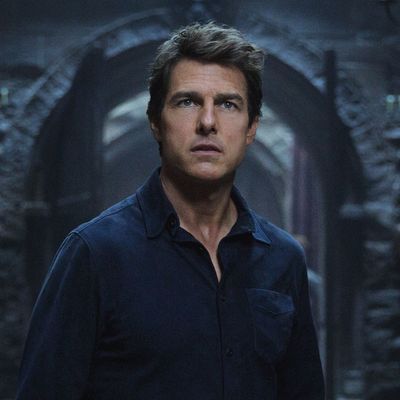
The Mummy is not your usual lousy movie. It has been made with skill and hits its marks. But those marks are so low and so brazenly mercenary that it doesn’t feel like much of an achievement. It’s not involving. This massive enterprise isn’t meant to stand alone as a horror-thriller but to set up a new, zillion-dollar-generating series in which Tom Cruise uses superpowers he doesn’t fully understand to fight monsters, aided by a Mission: Impossible–like team of high-tech demon hunters overseen by Russell Crowe as Dr. Henry Jekyll. (Possibly that team will have their own separate films with different “classic” monsters — there are many possible permutations.) Putting all this machinery in place means too much exposition and narrative side-shuffling. It’s not that the talented, high-priced writers — credited and uncredited — don’t know how to tell a story. It’s that the new studio priorities have hobbled storytelling. You can practically hear the executive pounding the table and yelling, “Make this my next tent pole!”
In accordance with those new priorities, the film requires three opening sequences, followed by a lengthy set-up with multiple character introductions, lots of mishaps, lots of chases, and an overlong, over-busy climax. That’s on top of many mini-climaxes: No one seems able to get from Point A to B without an intervening calamity. The movie starts with an entombment in the 13th century and then jumps to the 21st, when London transportation workers inadvertently bust into that tomb. Jekyll arrives to throw them out and then, for reasons I didn’t follow, narrates a second prologue, the story of an ancient Egyptian princess named Ahmanet (Sofia Boutella) who made a pact with the devil (or its Egyptian equivalent) for eternal life, slew her father and baby brother, and was captured, wrapped in gauze, and buried alive outside Egypt. Cut to that site in present-day Iraq, where Cruise as Nick Morton and Jake Johnson as his sidekick, Chris, scan a village under siege and plot to pilfer artifacts to sell on the black market. Their escapades lead — indirectly, after many gunfights, explosions, building collapses, and a sandstorm — to Ahmanet’s liberation from her ancient prison. She and her liberator, Chris, have a psychic link, so Cruise gets to furrow his brow and have visions of smooching with her amid the dunes.
This is a comic Cruise performance, meaning he broadly winces when taking blows, in contrast to his low-key winces as Ethan Hunt in the Mission: Impossible series and stoic endurance of pain as Jack Reacher. Plainly Cruise wants to be the Franchise King, although casting himself as the six-foot-six hobo-vigilante-fighting-machine Reacher hasn’t turned out as well as he hoped. He looks swell, though, for a man in his 50s, and he has given himself a scene where he’s buck naked to make sure we know it. I was especially impressed by his newly engorged trapezius, which makes him look like the Hulk’s Mini-Me. The key to the character of Nick is that he’s deeply self-centered — so says Jekyll’s assistant and Nick’s love interest, Jenny Halsey (Annabelle Wallis). Is there a core of goodness that will help him to overpower his mummy mind meld?
The psychic link — and Ahmanet’s desire to reanimate the spirit of her lover — owes something to the great Boris Karloff/Karl Freund original and the okay Hammer remake with Peter Cushing and Christopher Lee. But the resemblance ends there. The pacing is closer to the inexplicably popular Stephen Sommers movies of 1999 and 2001 and closer yet to Sommers’s swashbuckling flop, Van Helsing. Like Van Helsing, it’s an everything-but-the-kitchen-sink movie, with mummies, Jekyll and Hyde, and zombies, too. The director, Alex Kurtzman, keeps the action hurtling forward, but the fight scenes have no witty fillips, no dash, and there’s so much CGI that the movie feels prefab.
Boutella’s mummy is a frightening sight with her body bound and pretzeled: You can feel all that angry, compacted energy on the brink of busting out. It’s too bad that she’s playing “a vessel for the ultimate evil” instead of a three-dimensional person. You’d barely recognize her as the delightfully pugnacious alien Jaylah in Star Trek Beyond. But the biggest disappointment of The Mummy is Crowe, a major actor gone to seed and probably to self-loathing, in the late Brando mode. His evident boredom as Dr. Jekyll is more frightening than anything he does as Mr. Hyde — or anything else in the movie.





